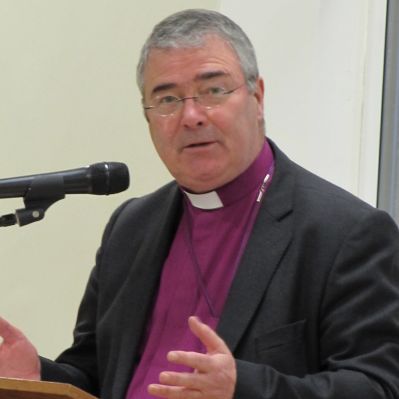 |
 |
News
Brexit: an Irish Church perspective
By The Rt Revd John McDowell, Church of Ireland Bishop of Clogher.

The Bishop of Clogher Right Revd. John McDowell.
Public commentary in the United Kingdom has been dominated for the past two-and-a-half years by one word: ‘Brexit’. The close relationship between our countries means that Brexit has inevitably pre-occupied minds in Ireland too.
In our own Church of Ireland community there has been considerable interest from people from all sides of the discussion.
For many living across these islands, the prospect of Brexit has brought profound uncertainty not just in the sphere of “high politics” but in many areas of everyday life. I am hopeful that a Withdrawal Agreement can be reached, which will provide some initial clarity for our citizens as they face the future.
However, it is only following a successful Withdrawal Agreement that detailed talks on the future UK-EU relationship will be possible. The subsequent implementation of Brexit 'in any form' will entail a period of major readjustment for both the UK and Ireland.
Therefore, we are facing a prolonged period of transformation and all of the key players involved will need to be as clear and honest as they can to help people on the ground to understand what changes will unfold.
The Churches, as longstanding and stable social partners throughout these islands, embedded in local communities, have an important part to play for the long haul.
In times of flux, the poorest and most vulnerable citizens are often the ones hit most heavily by the costs of economic and social disruption and the last to feel any promised benefits. As Churches and Church leaders, we have a vocation to speak on their behalf.
The consequences of this time of flux are of particularly deep concern in Northern Ireland. Last December’s Joint UK-EU Statement assured us of both sides’ commitment to the Good Friday (Belfast) Agreement, the peace process, and avoiding a hard border but reconciliation and stability in Northern Ireland are underpinned by many more factors than these high level issues.
Notwithstanding significant growth in recent years, our economy is particularly vulnerable to any squeeze in public finances. Our small and micro-businesses simply do not have the capacity to plan for or accommodate complex changes in market conditions or in the terms of trade. Our agri-food sector is much more significant than elsewhere in the UK and will be deeply exposed by any loss of funding and migrant workers, let alone by the introduction of tariffs and non-tariff barriers to trade.
The absence of a functioning Executive and Assembly has meant that our democratic institutions have had no policy input into the Brexit negotiating and planning process, notwithstanding the potential risks ahead.
The current democratic deficit compounds the sensitivities and fragility of its unique political and cultural circumstances. This has come to be exemplified in the Irish border issue.
It may surprise people not familiar with how the Irish Churches are organised to know that many of our dioceses (and some of our parish groupings) cross the border, and that as Church communities we have a common life which transcends national boundaries.
That experience has not always been easy or comfortable, especially during periods of uncertainty. Although tension around the Irish border can be easily caused, a strong and close relationship between the two governments has helped over time to keep the peace.
It is our prayer that the uncertainty and adjustment entailed by the UK’s withdrawal from the EU will not be allowed to damage the carefully-built trust and mutual understanding between the British and Irish governments, which must again be affirmed publicly as well as privately in word and action.
Protecting and building peace in its deepest sense must not be a mere platitude but a clear priority for all of us in leadership, especially as many are still suffering the consequences of past conflict. The Churches have a role in speaking out, alongside others, for the community and voluntary sector and commending their critical work in embedding reconciliation in local communities. Its funding is often short-term and has proved extraordinarily vulnerable in a period of austerity followed by the turbulence of the Brexit process.
On a wider level, we need also to acknowledge and celebrate the unique relationships between the people of these islands. History, geography, trade and many millions of family connections have bound our people closely together. Anglo-Irish history has been sometimes fractious and occasionally violent but our prosperity and peace now are joined together, and as friends in an uncertain world we have an obligation to co-operate closely. We are inescapably interdependent.
There is naturally a range of views among Church members on what this should mean in practice. However, the core message of Christianity requires that we desire the good of our neighbours and seek to follow the teaching and example of Jesus Christ in all aspects of our lives.
As a Church leader in the United Kingdom and Ireland, I would therefore encourage all of my fellow believers, individually and in parishes and congregations, to remember their vocation as reconcilers and peace-makers. Our hope is in the Lord of all the world, who has given us a vocation to be as generous in our judgements of others as He has been in His.
Peace in Northern Ireland is a precious example of the value that comes from co-operation, trust and friendship across national borders, especially in times of uncertainty. We must commit ourselves and our Churches to doing everything in our power to continue to build and secure that peace.